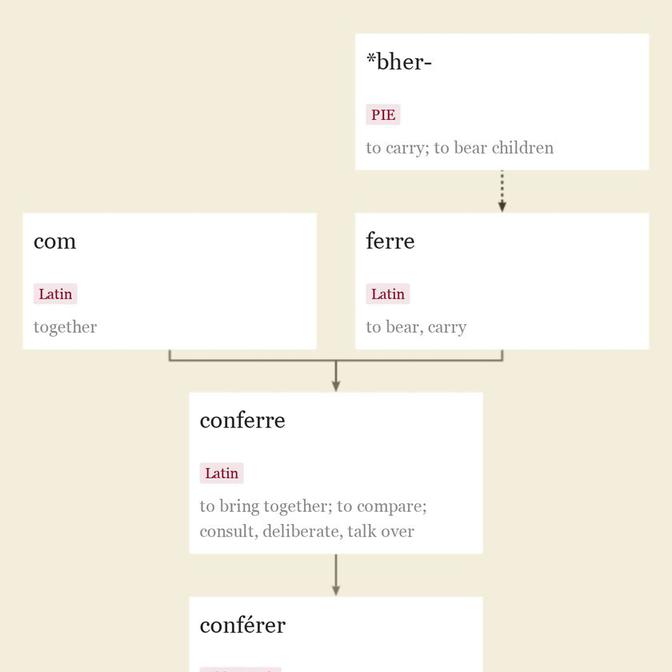conferment (n.)
"授予,确认",14世纪初; 见 confer + -ment。
最早记录年份: early 14c.
conferment 的相关词汇
confer (v.)

1530年代,“透过比较来审查”; 1540年代(不及物动词)“就某些特殊主题进行磋商”; 1560年代,“赠送作为礼物或永久性所有权”,源自14世纪的古法语 conférer “赠送; 交谈; 比较”,来自拉丁语 conferre “聚集”,比喻为“比较; 商量; 交流”,来自于 com “一起”(参见 con-)和 ferre “承担,运载”,源自于 PIE 根词 *bher-(1)“运输”,也可指“分娩孩子”。
“商量”的意义源于 conference 。最古老的英语含义是“比较”(常用于1530年至1650年左右期间),基本已经过时,但缩写 cf. 仍在使用。相关词汇: Conferred; conferring。
-ment
这是一个拉丁语常见后缀,最初来自法语,代表拉丁语 -mentum,它被添加到动词词干中,以制造表示动词行为结果或产品,或动词行为的手段或工具的名词。在俗语拉丁语和古法语中,它被用作动作名词的形成成分。法语在动词根和后缀之间插入一个 -e-(例如从 commenc-er 形成的 commenc-e-ment; 对于以 ir 结尾的动词,插入 -i-(例如从 sentir 形成的 sent-i-ment)。
从16世纪开始,与英语动词词干一起使用(例如 amazement, betterment, merriment,最后一个还说明了在这个后缀之前将 -y 变成 -i- 的习惯)。
The stems to which -ment is normally appended are those of verbs; freaks like oddment & funniment should not be made a precedent of; they are themselves due to misconception of merriment, which is not from the adjective, but from an obsolete verb merry to rejoice. [Fowler]
通常附加 -ment 的词干是动词的词干; 像 oddment 和 funniment 这样的怪异词不应成为先例; 它们本身是由于对 merriment 的误解而产生的,后者不是来自形容词,而是来自一个过时的动词 merry,意为“欢乐”。[福勒]